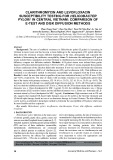
H. pylori infection
-
The rate of antibiotic resistance in Helicobacter pylori (H.pylori) is increasing in Vietnam in recent years and has become a main challenge in the management of H. pylori infection. To determine the antibiogram of H.pylori strains isolated from a population in Central Vietnam to clarithromycin, levofloxacin by E-test and disk diffusion, compare two diffusion methods.
 7p
7p  viuchiha
viuchiha
 06-01-2025
06-01-2025
 1
1
 1
1
 Download
Download
CHỦ ĐỀ BẠN MUỐN TÌM













